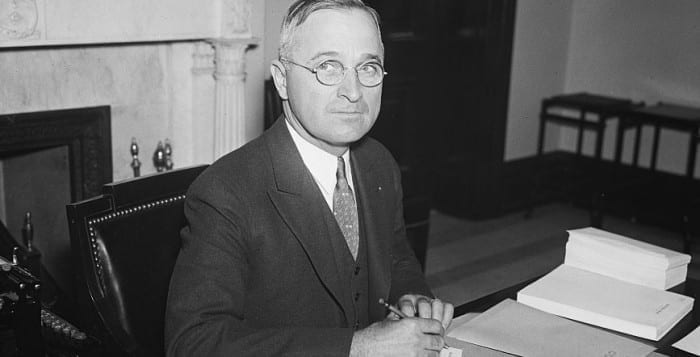By Rich Acritelli
The United States is still feeling the friction of the recent presidential election between President Donald J. Trump and President Elect Joseph R. Biden. Since the founding of this republic, our major presidential leaders and their followers fiercely fought to attain the presidency. As this is a period of division, unfortunately there have been many examples of resentment that has been seen by our leaders.
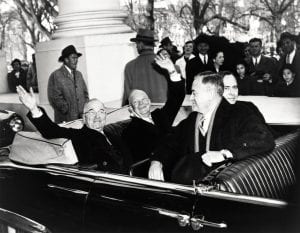
Years ago, the same tactics were used with the Election of 1800 between President John Adams, Vice President Thomas Jefferson, and Aaron Burr. While Adams and Jefferson were two key Founding Fathers that liked each other personally, they shared different views over the direction of the government. Although they worked together in the first administration of President George Washington and when Adams became President in 1797 and Jefferson the Vice President, these leaders marked the earliest establishment of the political parties, especially during the election process.
During his presidency, Adams had a difficult time governing this young nation. Always a respected figure, Adams was not an overly warm leader that was situated between the icons of the Father of the Nation in Washington and the writer of the Declaration of Independence in Jefferson. He desperately held onto the policy of neutrality and enforce the controversial laws of the Alien and Sedition Acts. His Vice President Jefferson was completely opposed to any actions that limited the civil liberties of Americans. Allied with James Madison, Jefferson sought the nullification of Adam’s legislation through the Virginia and Kentucky Resolutions. Adams was a one term President that left the officer after Jefferson and Burr received more votes in this election. At this point there were no running mates and Adams was forced out of the White House. It did not help Adams that powerful members like that of Alexander Hamilton criticized his presidential actions and openly wondered about his mental stability. Although Hamilton and Jefferson were competitive political opponents, Hamilton believed that Burr was unable to be trusted, and he pushed the election towards his rival in Jefferson. On the day of the inauguration, Adams refused to attend this transfer of power, and instead, he went home in disgust.
By the early part of the 1820’s, there was a different sense of leadership that was taking root in America after the last of the Revolutionary Era Presidents in James Monroe left office. By 1824, there was a major political battle that lasted more than four years between the ferocity of Andrew Jackson and John Quincy Adams to complete for the presidency. These men could not have been any different with Adams being the son of a former President that was very well educated, worldly, and astute within politics and foreign affairs. He opposed the iron will of Jackson who would be the first President that was born West of the Appalachian Mountains, served as a kid during the Revolutionary War, was a noted Indian fighter, plantation owner, self-educated lawyer, and a major general that secured the historic victory against the British at the Battle of New Orleans during the War of 1812. For most of his life Jackson demonstrated little restraint within his resentment towards the Native-Americans, British, and the aristocratic power of the Northeast and leaders like that of Adams whom he believed were the privileged class of Americans that ruled this nation.
For many people, Adams was a known political figure, and many older leaders, including Jefferson, were worried that Jackson was a threat to the democratic practices of this nation. They saw him as an erratic leader that partook in pistol duels and a man that was more than willing to carry out his physical threats. The Election of 1824 was led by Jackson, but he did not hold the majority of the popular vote, and this contest was pushed back to Congress to decide who be the next President. While Jackson expected to gain an imminent victory, Speaker of the House Henry Clay sought to use his influence to make a political bargain with maneuvering the gain a secretary of state position within the next administration.
Clay told Jackson who was ahead in the polls that if he was given this powerful post, he held enough clout to ensure his victory in congress. Jackson immediately refused this scheme, Clay offered the same deal to Adams who had far fewer votes. Adams accepted Clay’s proposal, and this propelled him to take over the presidency from James Monroe. For two elections in 1824 and again in 1828, both Adams and Jackson openly battled each other during this decade. Like that of Trump and Biden, they were both from opposite backgrounds, and they publicly criticized each other. As we most recently observed Trump calling Biden “Sleepy Joe” and Biden claiming that Trump was a “Clown,” this personal mudslinging has always been a negative tool for candidates to utilize. Adams claimed that Jackson’s mother was a prostitute and Jackson stated as a foreign minister that Adams procured young girls to partake in sexual favors for Russian leaders.
In 1860, Abraham Lincoln was a promising local political figure from the state of Illinois. He only served one term during the height of the US-Mexico War, where he opposed President James K. Polk’s rationale to go to war. Lincoln demanded proof that “American blood was shed on American soil” at the start of this war between America and Mexico. After his brief stint as a representative, Lincoln was a savvy lawyer that served several terms in the Illinois Senate. He gained national prominence in 1858 during his senate campaign against Stephen Douglas, where he became the face of the Republican Party, and a known threat against the institution of slavery in the South.
Lincoln openly suggested that there were far too many compromises over slavery and that it should not expand into the new western territories and states. In a series of debates within Illinois, Lincoln showcased himself as a Republican leader that clearly expressed his will to oppose this southern form of labor. Even as Lincoln lost this election, he rose to national prominence and was a dominant Republican to replace President Buchanan who refused to run for a second term in 1860. There were written stories in the papers that Lincoln was motivated to intermingle the races and that he lacked intelligence through his country folk manner to lead this country.
By gaining a sectional victory that saw him win most of the populated states in the Northeast and Midwest, Lincoln won the presidency, and the South began to secede. But President Elect Lincoln had no constitutional authority to oppose the divisive actions of the South and this crisis for more than five months were still left within the inept hands of Buchanan. Always the lawyer, Lincoln must have surely bit his own tongue during his first meeting with Buchanan who did nothing to halt the Confederacy from being created by Jefferson Davis. Like that of Franklin D. Roosevelt who had to wait to take over the presidency in 1933 during the height of the Great Depression, Lincoln watched southern states leave the country during an extremely perilous time.
When Lincoln finally left Springfield, Illinois in March of 1861, there were already death threats that were made against him, and Pinkerton detectives quickly moved him out of Baltimore under a disguise and into the capital. During his first term, he had to endure the military failures of generals like that of George B. McClellan that was prodded to fight the Confederates. He agonized over the severe casualties of Americans that were killed at Shiloh, Antietam, and Gettysburg. And personally, his own family’s death of his second son Willie from typhoid fever in 1862.
The North grew tired from the massive casualties of the fighting, the financial costs, and the unwillingness of the outnumbered and outgunned southerners to surrender. Once Lincoln understood that General Ulysses S. Grant would not oppose him as President in 1864, he promoted this combat figure to command the northern armies. It was a pivotal time for Lincoln who needed to gain major battlefield successes to prove to the northern public that his leadership would eventually defeat the South. As Confederate General Jubal Early operated outside of Washington D.C., close enough to see the capital dome, and McClellan being nominated to lead the Democratic Party, the months leading to this election were bleak. Even the South politically and financially opposed the re-election of Lincoln, by secretly sending money to northern Democrats in Congress that maneuvered to defeat the President. Many of politicians that served in Lincoln’s cabinet were convinced that he was an outgoing figure. But coupled with the tenacity of Grant, General William T. Sherman, and Philip Sheridan, Lincoln held on in 1864, to regain a second term, and persistently gain the surrender of General Robert E. Lee at Appomattox Courthouse some six months later.
And in 1953, as former Supreme Commander of Allied Expeditionary Forces General Dwight D. Eisenhower and outgoing President Harry S. Truman both drove together to the inauguration, these men had little fondness towards each other. As they were both Mid-western men that came from poor families, these were the only two similarities between these powerful leaders. While Eisenhower was the leader of the massive military forces against Hitler during World War II, Truman was a captain in the field artillery during World War I. Eisenhower was educated at the United States Military Academy at West Point, NY, Truman never graduated from high school. Whereas Eisenhower was an outstanding athlete that was well liked, Truman never shied away from expressing controversial views. Truman ordered the dropping of two atomic bombs to end the war in the Pacific and Eisenhower was opposed to use of this weapon against a beaten enemy. While it seemed that Eisenhower’s popularity had endless bounds, it was believed that Truman would lose his re-election to Thomas Dewey in 1948. As Truman won this election, the newspapers did not bother to wait until all of votes for this contest was counted, as they incorrectly printed main titles “Dewey Defeat’s Truman.”
After many years of downplaying any suggestions that he would run for presidency, Eisenhower finally accepted the Republican nomination to oppose Democratic challenger Adlai Stevenson. Always armed with his trademark grin “Ike” quickly realized that running for office was no easy task. He openly opposed the last several years of Truman’s leadership that he deemed corrupt and weak against the communists. But he had to answer questions about his running mate Richard M. Nixon’s own illegitimate use of campaign funds and his lack of support for General George C. Marshall who was vehemently attacked as being weak against communism by Senator Joseph McCarthy. And while Truman was leaving the office, he refused to be quiet against the presence of Eisenhower. Truman openly called Eisenhower a Republican “Stooge” who had no original views of his own and was a “Puppet” of this party’s political and business leaders.
Ike still had to deny the rumors that he was unfaithful towards his wife Mamie during World War II with his beautiful Irish driver Kay Summersby. For a moment, it was believed that Eisenhower was going to bring this military member of his family back to the states after the war and divorce his wife over the extreme objections of Marshall. When he finally won the presidency and he met with Truman during the transitional period, Eisenhower stated to the President that he could not believe that the media continued to write about his relationship with Summersby. Truman responded that he would be lucky if that was all the media covered about him as a leader of this nation. While Eisenhower led the greatest invasion that the world had ever known at Normandy in 1944, Truman told him that the presidency was not the army, and he wished him good luck in trying to get members of Congress and politicians to support his directives. It did not take long for Eisenhower to understand the true magnitude of the presidency with dealing with the escalation of the Cold War with the Soviet Union and the fears of Americans over the communist strength of launching Sputnik. And there were the complexities of integration through the Brown vs. Board of Education Ruling in 1954 and the massive use of civil disobedience that was widely promoted by Martin Luther King during Eisenhower’s two terms.
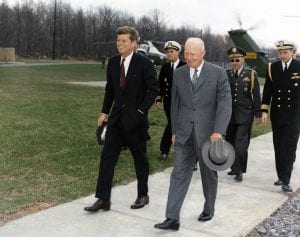
In 1960, there was a noticeable division in the air through the rise of an extremely younger John F. Kennedy towards the presidency and the stepping down of Eisenhoer. There was also the presence of Nixon, who was the Republican hope of defeating Kennedy. While he was a two term Vice President, it took some time for Eisenhower to finally endorse his former running mate. Eisenhower was always seen as a likeable figure that was able to communicate with others through politics, the military, and athletics. He openly wondered how Nixon was able to go through life without having one single friend.
This was an interesting time, as Eisenhower did not believe that Kennedy was prepared for the White House, whom he still considered a “boy” to replace him in office. But he was not pleased in supporting Nixon to be his Republican replacement. Eisenhower resented the claims by Kennedy that our country grew weaker against the Soviet Union during the Cold War under his tenure. He believed that Kennedy presented inaccurate estimates that the communists had an increasing “missile gap” against the United States. This senior President also stated that Kennedy had virtually no experience and that he was politically being protected to enhance an untruthful image. JFK openly battled against the questions of being too young at forty-three years old, his lack of time in Congress, and the hatred that he faced for being a Catholic.
Like that of Lincoln, Kennedy was able to utilize his considerable speaking talents within the 1960 presidential debates. Television was a new way of personifying these two key leaders. Nixon suffered from the flu, refused wear make-up, and the close-ups did not make him look appealing to Americans, as he did not shave and was openly sweating. JFK was a capable speaker, showed charisma, and masterfully answered the questions that was presented to him. Although Nixon did not look healthy compared to the tan of Kennedy, many people do not realize that JFK suffered from the severity of Addison’s Disease. And he also had poor bone structure and the re-occurring back injuries that he sustained from PT-109 during World War II in the Pacific. It was estimated that 90% of Americans owned televisions in the nation and that seventy million citizens sat down in their homes to watch these candidates verbally spar against each other.
There was an interesting dynamic that is noticed between the personalities of Kennedy, Nixon, and the outgoing Eisenhower. Both Eisenhower and Nixon came from poor backgrounds, but they had no similarities within their personalities, and in eight years as President and Vice President they were never close. Kennedy spoke of a newer generation taking the helm from older leaders like that of Eisenhower, but people were drawn to the attributes of both men. Eisenhower was a trusted figure that led this nation during times of war and peace and while Kennedy was extremely wealthy, both him and his older brother Joseph served with distinction during World War II. And JFK was envied by both men and women. Male voters saw a presidential candidate that had a beautiful wife, a young family, and descended from immense wealth. Female voters ascertained that JFK was one of the most handsome leaders to ever run for the presidency. And there was Nixon with his minimal personality and outwardly cold demeanor that did not endear him to many Americans.
The victory of Kennedy over Nixon was the passing of a new torch from the trustfulness of Eisenhower to the different ideas of JFK. On that cold January day in 1961, Kennedy addressed the abilities of the nation, the emergence of a new generation of leaders, and the vision of rapid economic, racial, political, and military changes that were in store for this nation and world during this decade. But the concerns that Eisenhower presented over the judgment of Kennedy were apparent during the failed Bay of Pigs invasion in April of 1961. After this debacle that embarrassed the leadership of Kennedy to both the American public and to the Soviet Union, Eisenhower met with him. The pictures of these two leaders at Camp David presented the teacher in Eisenhower speaking with the younger pupil in Kennedy. And while both men spoke out against each other during the Election of 1960, they cared deeply about this nation during times of crisis.
With Biden creating his cabinet, gaining the approval to see national security reports, and preparing to be the President of the United States, his poor relationship with Trump, is not unusual. Hopefully, there will be some common ground between these two opposite leaders for the good of America. And while this upcoming inauguration will surely be different due to the restraints of Covid-19, may this transition of power go smoothly, to ensure the vital national tradition of leadership changes that has been consistent since the days of President George Washington.
Rich Acritelli is a social studies teacher at Rocky Point High School and an adjunct professor of American history at Suffolk County Community College.


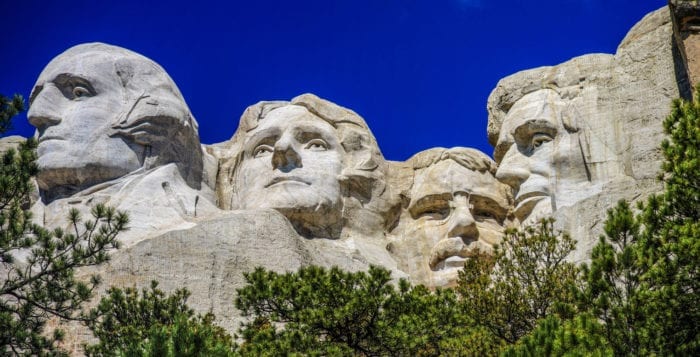
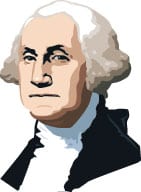 “I think he was someone that really believed in a cause. In his case, the cause was an independent America and he was willing to sacrifice his time and his family’s time to make that happen. He certainly took great personal risks as a general and, again, as president, he sacrificed his time and the rest of his life was dedicated towards the country.
“I think he was someone that really believed in a cause. In his case, the cause was an independent America and he was willing to sacrifice his time and his family’s time to make that happen. He certainly took great personal risks as a general and, again, as president, he sacrificed his time and the rest of his life was dedicated towards the country.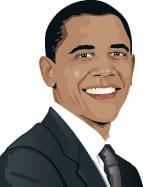 “I’ve been in the Legislature for six years, and got elected in 2011, which was then-president Obama’s third year in office. I had been a physician and I was a big participant in getting involved in the hope and change … Obama being the first Black American president was inspirational for me as one of the few Black American elected officials.
“I’ve been in the Legislature for six years, and got elected in 2011, which was then-president Obama’s third year in office. I had been a physician and I was a big participant in getting involved in the hope and change … Obama being the first Black American president was inspirational for me as one of the few Black American elected officials.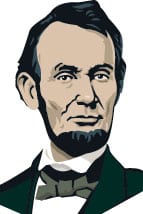 “If you were in my office, whether in Albany or here in the district, you would see lots of pictures of Abraham Lincoln. When you’re growing up and you’re reading about different presidents, the idea of Lincoln being kind of a frontiersman and the way he grew up and the stories about him are very exciting. As you get older and you start looking into Lincoln’s life, you see the kind of person that he is. He cared very deeply about people and if you look at photos of Lincoln, you could see the deep lines, as some people call “worry lines,” because he cared so much. During the Civil War, he visited wounded soldiers and was very touched by their lives.
“If you were in my office, whether in Albany or here in the district, you would see lots of pictures of Abraham Lincoln. When you’re growing up and you’re reading about different presidents, the idea of Lincoln being kind of a frontiersman and the way he grew up and the stories about him are very exciting. As you get older and you start looking into Lincoln’s life, you see the kind of person that he is. He cared very deeply about people and if you look at photos of Lincoln, you could see the deep lines, as some people call “worry lines,” because he cared so much. During the Civil War, he visited wounded soldiers and was very touched by their lives.